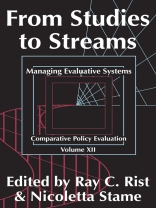Recent developments in policy evaluation have focused on new notions of process and use or, notably, ‘influence.’ But this debate among evaluators on how evaluations are used has been essentially a closed one—evaluators talking only among themselves. The debate has gone on seemingly oblivious to fundamental changes in the intellectual landscape of public management, organizational theory, information technology, and knowledge management. New realities demand a different approach toward evaluation.
The current era is characterized by the emergence of an increasingly global set of pressures for governments to perform effectively, not just efficiently, and to demonstrate that their performance is producing desired results. Information technology allows enormous quantities of information to be stored, sorted, analyzed, and made available at little or no cost. The result for those in the evaluation community is that, while individual evaluations are still conducted and reported upon, they are a rapidly diminishing source of information.
In the new environment, ever accelerating political and organizational demands and expectations are reframing thinking about the definition of what, fundamentally, constitutes evaluation and what we understand as its applications. In this twelfth volume in the Comparative Policy Evaluation series, authors from fourteen nations address these issues from multiple vantage points. From Studies to Streams is an essential tool for policymakers, government officials, and scholars interested in the contemporary status of evaluation.
About the author
Nicoletta Stame teaches social policy at the University "La Sapienza, " Rome. She was a co-founder and first president of the Italian Evaluation Association. Her previous publications include L’esperienza della valutazione.












